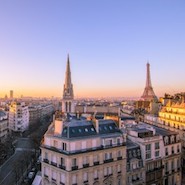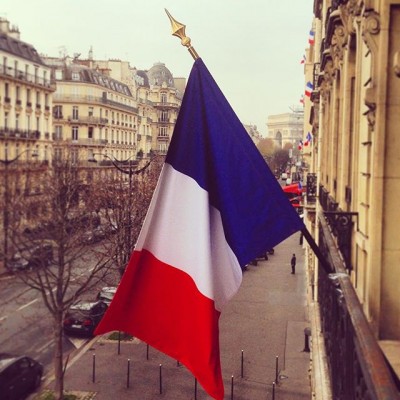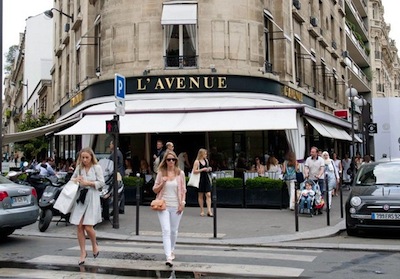 View from Four Seasons Paris
View from Four Seasons Paris
For the first time since 2011, Paris is not among the top 10 international destinations, according to a recent survey by Travel Leaders Group.
The Nov. 13 attacks in Paris, in which armed Daesh militants attacked several locations in rapid succession, leaving 130 dead and hundreds injured, are the primary reason for the drop. At the same time, an optimistic consumer outlook projects to vastly increased booking and spending in 2016.
"It’s important to note that the survey was conducted immediately after the Paris attacks – [but even so ]Paris remains a top international destination for American travelers, even if it just barely missed a top ten slot at number 11 out of 162 destinations worldwide that were specifically named by our travel agents," said Steve Loucka, chief communications officer at Travel Leaders Group, Minneapolis. "Traditionally, Paris is visited most frequently by Americans during the spring and summer months, so there is still plenty of time to get beyond the headlines into the spring and summer booking season.
"Barring any additional negative headlines, we certainly expect Paris to rebound even further," he said. "There is clearly a fount of goodwill among the traveling public toward the French people, and Parisians in particular, and we have also seen many of our own travel agents wishing to stand in solidarity with them by visiting France and demonstrating just how safe it actually remains."
“2016 Travel Trends Survey” surveyed 1,216 United States-based travel agency owners, managers and agents, over 80 percent of whom cater to luxury travelers, to determine leading travel destinations domestically and abroad, as well as attitudes and outlooks toward travel for the next calendar year.
Tourists down, buying power up
Paris had been steady in recent years, ranking eighth, ninth, eighth and seventh from 2012 to 2015 before falling to eleventh for 2016. The ranking is still higher than from 2005-2009, reflecting post-recession adventurousness and the increasing importance of travel to consumers.
When asked, "Have the events unfolding in France caused your clients to cancel or delay travel to France?”, 54.5 percent currently had bookings for France. Among them, about 60 percent said all of their clients were continuing with immediate or future plans.
 Kering's Facebook photo in the aftermath of the Nov. 13 attacks
Of the remaining agents with bookings for France, half indicated that a small percentage of clients delayed trips and another three percent more said a large portion of clients have postponed. Almost a third said a few clients have canceled trips, another thirteen percent said “some” canceled and the remaining three percent said “a significant number” did.
In total, about 17 percent of agents with clients who had planned on traveling to France had at least a few cancellations.
Tourism accounts for about 8 percent of the French economy, meaning that even a small decrease in tourists could have a noticeable impact on the country’s economic state.
The good news, however, is that almost forty-five percent said they plan on spending more per trip in 2016 than they did in 2015, while half say they plan on spending the same. The strength of the U.S. dollar and the weakening of the euro, in addition to lowering fuel prices leading to cheaper plane tickets, mean almost all travelers will have more money to spend while abroad.
As such, European retailers have an opportunity to capitalize on noticeably increased spending power among U.S. tourists. If those who do travel to France buy more, it will help alleviate the hit from fewer tourists overall.
Kering's Facebook photo in the aftermath of the Nov. 13 attacks
Of the remaining agents with bookings for France, half indicated that a small percentage of clients delayed trips and another three percent more said a large portion of clients have postponed. Almost a third said a few clients have canceled trips, another thirteen percent said “some” canceled and the remaining three percent said “a significant number” did.
In total, about 17 percent of agents with clients who had planned on traveling to France had at least a few cancellations.
Tourism accounts for about 8 percent of the French economy, meaning that even a small decrease in tourists could have a noticeable impact on the country’s economic state.
The good news, however, is that almost forty-five percent said they plan on spending more per trip in 2016 than they did in 2015, while half say they plan on spending the same. The strength of the U.S. dollar and the weakening of the euro, in addition to lowering fuel prices leading to cheaper plane tickets, mean almost all travelers will have more money to spend while abroad.
As such, European retailers have an opportunity to capitalize on noticeably increased spending power among U.S. tourists. If those who do travel to France buy more, it will help alleviate the hit from fewer tourists overall.
 L'Avenue paris
Additionally, more than 44 percent of agents said 2016 bookings at this time exceed 2015 bookings at the same time last year, further indicating that experiences, travel chief among them, are increasingly valued above material goods. For hotels, this means that a good room is no longer enough; they must find creative ways to improve the traveler’s experience in the city.
Nous sommes tous les Parisiens
Although it is difficult to tell how long Paris’ and France’s tourism industries will feel the aftershocks, the impact is already being felt.
In the wake of a widespread terrorist attack in Paris, the tourism industry in the world capital is likely to feel the aftershock.
Immediately after the tragedy, a number of tourists began canceling their trips to Paris, sending the stock of carrier Air France and a number of other travel providers tumbling. Following a weekend of mourning, Paris tourist attractions such as the Louvre are now reopened, signs of a return to normalcy, but France’s president Francois Hollande has proposed an extended state of emergency for the next three months, which may keep international travelers away for the foreseeable future (see story).
Many French brands and consumers are already taking measures to revitalize tourism to avoid an economic downturn.
In the continuing aftermath of Paris’ Nov. 13 attacks, brands and consumers alike are showing their solidarity by declaring #ParisWeLoveYou.
In addition to the emotional toil that will forever remain with the victims, their loved ones and the collective consciousness of the French and Parisians, the country has also taken an economic hit due to a resulting decline in the tourist industry. Alliance 46.2 has launched a solidarity campaign for brands and consumers to show pride in Paris and to help revitalize tourism to give the country a necessary economic boost (see story).
"The overwhelming optimism tells us a lot about the consumer’s aspirations and determination to travel," Mr. Loucka said. "American travelers view travel as a right, and they will not be deterred.
L'Avenue paris
Additionally, more than 44 percent of agents said 2016 bookings at this time exceed 2015 bookings at the same time last year, further indicating that experiences, travel chief among them, are increasingly valued above material goods. For hotels, this means that a good room is no longer enough; they must find creative ways to improve the traveler’s experience in the city.
Nous sommes tous les Parisiens
Although it is difficult to tell how long Paris’ and France’s tourism industries will feel the aftershocks, the impact is already being felt.
In the wake of a widespread terrorist attack in Paris, the tourism industry in the world capital is likely to feel the aftershock.
Immediately after the tragedy, a number of tourists began canceling their trips to Paris, sending the stock of carrier Air France and a number of other travel providers tumbling. Following a weekend of mourning, Paris tourist attractions such as the Louvre are now reopened, signs of a return to normalcy, but France’s president Francois Hollande has proposed an extended state of emergency for the next three months, which may keep international travelers away for the foreseeable future (see story).
Many French brands and consumers are already taking measures to revitalize tourism to avoid an economic downturn.
In the continuing aftermath of Paris’ Nov. 13 attacks, brands and consumers alike are showing their solidarity by declaring #ParisWeLoveYou.
In addition to the emotional toil that will forever remain with the victims, their loved ones and the collective consciousness of the French and Parisians, the country has also taken an economic hit due to a resulting decline in the tourist industry. Alliance 46.2 has launched a solidarity campaign for brands and consumers to show pride in Paris and to help revitalize tourism to give the country a necessary economic boost (see story).
"The overwhelming optimism tells us a lot about the consumer’s aspirations and determination to travel," Mr. Loucka said. "American travelers view travel as a right, and they will not be deterred.
"The hotels that are proving to be the most popular among our travel agents are the ones that are providing the most overall value – it’s fundamentally important to note that price does not equal value," he added. "Value for our clients includes those hotels that provide room upgrades, early check-ins and late check-outs, complimentary breakfasts, free Wi-Fi and a host of other value-added amenities – including recognition of the consumer’s hotel loyalty affiliations – that a traveler won’t find online via the offerings that are based simply on pricing."
Final Take Forrest Cardamenis, editorial assistant on Luxury Daily, New York